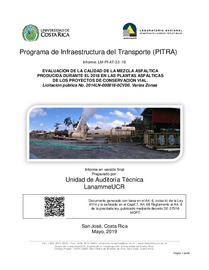Informe en versión final de auditoría técnica externa Evaluación de la calidad de la mezcla asfáltica producida durante el 2018 en las plantas asfálticas de los proyecyos de conservación vial. Licitación pública No. 2014LN-000018-0CV00. Varias Zonas.
Fecha
2019-05Autor
Cervantes Calvo, Víctor
Fonseca Chaves, Francisco
Sequeira Rojas, Wendy
Loría Salazar, Luis Guillermo
Metadatos
Mostrar el registro completo del ítemResumen
Sobre los materiales que conforman la mezcla asfáltica: La granulometría, tanto de la mezcla convencional, así como la de la mezcla modificada con polímero, en su mayoría, cumple con lo indicado en las especificaciones contractuales. Respecto al contenido de asfalto las mezclas convencional y modificada de 12mm cumplen las especificaciones, sin embargo, se determinan algunos incumplimientos para la mezcla asfáltica de 19mm, para ambos tipos de mezcla (convencional y modificada).
Sobre la calidad la mezcla asfáltica producida: Para las mezclas asfálticas producidas con ambos tipos de asfalto y para los dos diferentes tipos de agregados se determina algunos incumplimientos en los parámetros volumétricos, tales como: contenido de vacíos, vacíos en el agregado mineral (VMA), vacíos llenos de asfalto (VFA) y la relación polvo/asfalto.
Sobre el desempeño de la mezcla asfáltica: Ambos tipos de mezcla asfáltica (convencional y modificada) producidas con ambos tipos de agregados muestran tener una excelente resistencia al ahuellamiento (deformación permanente) de la mezcla, determinada con el APA, Rueda de Hamburgo y Flow Number. Sin embargo, la mezcla convencional de ambos tamaños, muestra ser susceptible al daño por fatiga (agrietamiento) determinado por el ensayo a fatiga. Por su parte, un 17% de la mezcla modificada demuestra tener una adecuada resistencia al daño por fatiga, para ambos de tamaño de agregados.
Sobre el diseño de la mezcla asfáltica: se establece que los parámetros volumétricos de vacíos llenos de asfalto (VFA) y porcentaje de vacíos en la mezcla restringen el rango de contenido de asfalto de los diseños de ambos tipos de mezcla asfáltica (convencional y modificada) y para ambos tamaños de agregado, determinando un riesgo potencial de incumplimiento durante el proceso de producción, tal como se comprobó con los resultados de ensayo de las mezclas analizadas. About the materials that make the asphalt mix: Most granulometry meets results indicated in contract specifications for both conventional mixing, as the modified polymer mixture. The asphalt content in the conventional and modified mixture 12mm meet specifications. However, some non-compliance for the asphalt mix 19mm, for both types (conventional and modified) mixture is obtained.
About the quality of the asphalt mixture produced: There are some non-compliance in the volumetric parameters, such as: content of voids, voids in the mineral aggregate (VMA), voids full of asphalt (VFA) and the dust / asphalt ratio for the asphalt mixtures produced with the two types of asphalt and for the two different types of aggregates (12mm and 19mm).
About the performance of the asphalt mix: Both types of asphalt mixture (conventional and modified) produced with both types of aggregates (12mm and 19mm) shown to have excellent resistance to rutting (permanent deformation) of the mixture, determined by the APA, Hamburg Wheel and Flow Number. However, the conventional mixture of both sizes, sample be susceptible to fatigue damage (cracking) determined by the fatigue test. Meanwhile, 17% of the modified mixture demonstrated adequate resistance to fatigue damage with both size aggregates.
About the design of the asphalt mix: the volumetric parameters of asphalt filled voids (VFA) and percentage of voids in the mixture tend to reduce the range of asphalt content of the designs of both types of asphalt mix (conventional and modified) and for both aggregate sizes. Therefore, there is a potential risk of non-compliance during the production process, as was verified with the test results of the analyzed mixtures.
Colecciones
- Informes [1088]

